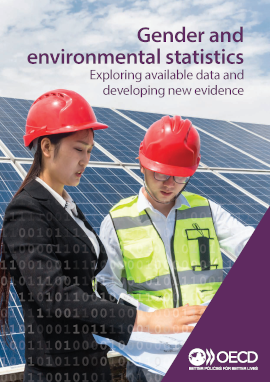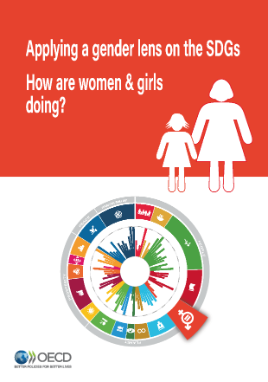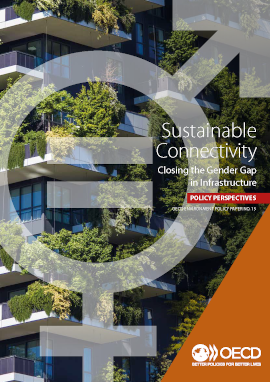Environment
Gender, inclusiveness and the SDGs
Environmental factors may affect men and women differently, due to different behaviours and roles they play in many societies as well as their different physiological characteristics. Whether one looks at energy, water, transport, urban design, agriculture, or consumption patterns a gender lens is key to understand differences in environmental impacts. For instance, women account for a large proportion of the more than 4 million deaths a year from in-door air pollution. Environmental degradation can also lead to increased gender-based violence. On the other hand, women’s economic, social and political empowerment can help accelerate action on climate, environmental protection and conservation.
The OECD works to support countries in integrating gender and inclusiveness aspects in the design and implementation of policies that provide better environmental, economic and social outcomes and improve well-being for all society, and to deliver on the Agenda 2030.
COVID-19 Global Gender Response Tracker with a Green Lens
The OECD, with UNDP and UN WOMEN, have developed a COVID-19 Global Gender Response Tracker with a Green Lens. The “Gender-Green tracker” builds on the UN COVID-19 Global Gender Response Tracker and the OECD Green Recovery Database, and identifies green and gender-sensitive measures, in more than 200 countries and territories, through the gender-environment nexus. Only 54 measures from the 2,079 total measures fall under the gender environment nexus. Analysis on the Tracker shows that countries worldwide missed the opportunity to address the gender and environment issues in tandem during the pandemic.
WATCH THE REPLAY: Green Talks LIVE - The Gender-Environment Nexus
Gender equality and environmental sustainability are gaining political momentum as global challenges that require urgent co-ordinated action. Women and men around the world are affected in a differentiated way by climate change, deforestation, land degradation, desertification, unsustainable infrastructure, growing water scarcity and inadequate sanitation, making the goals of gender equality and environmental sustainability mutually reinforcing. They may also experience differentiated health impacts from air pollution and chemicals. Yet, very few countries integrate a gender lens to their environmental data collection and policy making.
On 30 March 2023, the OECD held a Green Talks: LIVE webinar, with an introduction by Jo Tyndall, OECD Environment Director and a presentation by Dimitra Xynou and Valentina Bellisi, Policy Analysts from the Green Finance and Investment division. They were joined by Krzysztof Michalak, Acting Head of the Finance, Investment and Global Relations Division at the OECD Environment Directorate, and Co-ordinator for Gender, and Ana Puy from the Spanish Ministry for the Ecological Transition and the Demographic Challenge.
The presentation and discussion with experts on the gender-environment nexus highlighted the importance of integrating a gender lens in environmental and climate policies.
- WATCH THE VIDEO REPLAY and ACCESS THE PRESENTATION (PPT)
Report: Supporting Women’s Empowerment through Green Policies and Finance
The OECD Policy Paper Supporting Women’s Empowerment through Green Policies and Finance explores the role of green policies, green and sustainable finance and infrastructure in supporting gender equality and women’s empowerment. The paper finds that while the interlinkages that shape the gender-environment nexus are starting to be acknowledged, further efforts are needed to foster synergies between gender and environmental goals in policy design, sustainable finance approaches as well as in infrastructure planning and implementation.
On 7 October 2022, the OECD hosted a virtual panel session on The gender-environment nexus: Breaking silos in sustainable finance during the 9th edition of the OECD Forum on Green Finance and Investment. Speakers included: Suzanne Biegel, Founder, Catalyst at Large and Co-founder, GenderSmart; Aubrey Paris, PhD, Policy Advisor, Gender, Climate & Innovation, United States Department of State; Elena Ruiz Abril, Regional Policy Advisor for Women’s Economic Empowerment for West and Central Africa, UN Women; Delia Sánchez Castillo, Director, Planning and Evaluation, Banobras; Barbara Rambousek, Director, Gender and Economic Inclusion, European Bank for Reconstruction and Development (EBRD); and Julie Segal, Senior Manager, Climate Finance, Environmental Defence.
Missed the session? WATCH THE REPLAY.
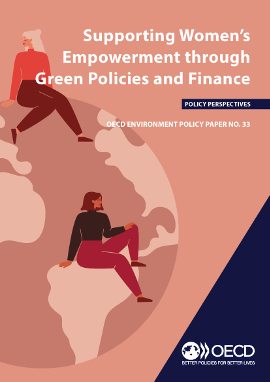
Read the report: Supporting Women’s Empowerment
through Green Policies and Finance
Report
The 2022 report Empowering Women in the Transition towards Green Growth in Greece observes the gender-environment nexus in the Greek policy framework and assesses environmental and climate policies through a gender lens, and gender equality policies through an environmental lens. It focuses mainly on policies and measures that could support women’s economic empowerment in environment-related sectors; women’s environmental leadership and decision making; and mainstreaming gender equality and environmental sustainability in policy tools.
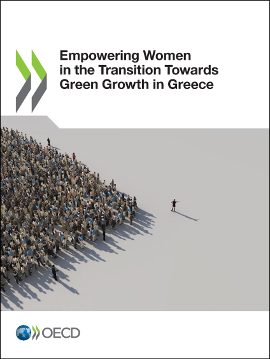
Read the report: Empowering Women in the Transition
towards Green Growth in Greece
OECD Policy Responses to Coronavirus (COVID-19)
- The OECD Policy Responses to Coronavirus (COVID-19) on Gender-relevance of policies in the OECD Green Recovery Database maps gender-sensitive measures in the OECD Green Recovery Database, identifies additional policy areas where gender sensitivity would be beneficial, and proposes policy actions to help countries align their commitments to gender equality and environmental objectives during the COVID-19 recovery (Dec 2021)
Report: Gender and the Environment
The 2021 report Gender and the Environment: Building Evidence and Policies to Achieve the SDGs summarises the OECD’s initial research on the topic, including key findings from the first Environment Policy Committee's survey on integrating gender into environmental policies, as well as from the 2020 Global Forum on Environment: Mainstreaming Gender and Empowering Women for Environmental Sustainability.
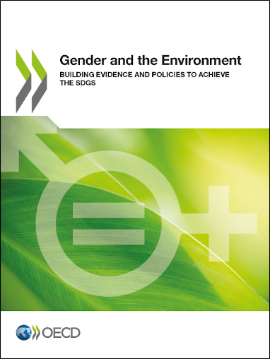
Read the report: Gender and the Environment
Building Evidence and Policies to Achieve the SDGs
OECD PODCAST: Women, climate change and data: Why we need to better understand the environment-gender nexus (March 2022)
The data is clear: environmental degradation affects women differently than men, and women are more motivated to do something about it. Ingrid Barnsley, Deputy Director of the Environment Directorate at the OECD, discusses the complex, multi-facetted relationship between gender equality, women, climate change, air pollution, domestic violence, and green technology patents in this OECD Podcast.
- Access the written podcast.
Survey on integrating gender in environmental policies
In 2019-20, the OECD conducted a survey of all its members on how they integrate gender in environmental and environment-related policies. The results show that the majority of OECD countries have some type of strategic framework on gender equality and/or gender mainstreaming, in particular for areas such as climate change; agriculture and forestry; energy; and green entrepreneurship jobs. Yet only 11 countries responded affirmatively when asked whether they collect gender-disaggregated data related to environmental policies or the environment more broadly. The gap between policy and data collection is an indication that the integration of the gender and environment agendas is far from complete.
Read more on the survey results.
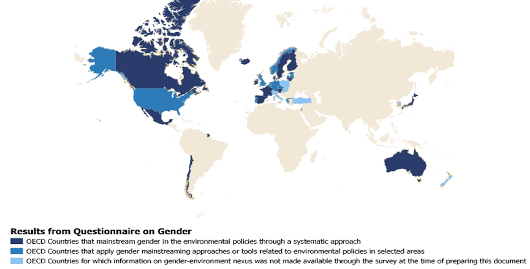
Data and evidence
Though case study evidence increasingly shows linkages between gender and the environment, data collection and indicators on the interlinkages are generally scarce both at national and global levels. In order to inform better policies to achieve the gender equality and environmental sustainability goals as enshrined in the Agenda 2030 for Sustainable Development, the OECD is strengthening its efforts to identify data gaps and collect relevant data.
In addition to gender, the 2030 Agenda calls for further disaggregation, such as by income, geography, age and disability for targets to be adequately measured and ultimately met. The OECD has already identified three new indicators, which will be further developed with a gender component, specifically:
- mortality rates from air pollution, differentiated by pollutant, sex, country, year and age;
- development of green technologies, based on patenting activity, differentiated by domain, sex, country and year, and
- exposure to environmental risks, differentiated by pollutant and river flooding, sex, age.
|
|
Brochure: Applying a gender lens on the SDGs: |
Gender equality and sustainable infrastructure
Good quality and sustainable infrastructure that meets the needs of women, men, children, minorities, people with disabilities and other vulnerable groups is essential for human well-being, economic growth and environmental sustainability. The OECD Knowledge Partnership for Sustainable and Inclusive Infrastructure initiative will foster evidence-based analysis of the interaction between sustainability and inclusiveness goals. It will provide a knowledge-sharing platform that connects government, business and civil society stakeholders engaged in accelerating progress towards these goals. The initiative was showcased in the Space for Solutions of the Paris Peace Forum in Paris on 11-13 November 2019.
The Policy Perspectives on Sustainable connectivity: Closing the gender gap in infrastructure shows how women and men may use infrastructure differently according to their needs, social roles or preferences. Building on OECD policy tools and several axes of work, it provides a framework to help countries align their infrastructure policies and projects with other societal and environmental goals, including supporting gender equality.
|
|
Watch the videeo: Closing the Gender Gap in Infrastructure |
Further reading
- Working Paper: Women’s leadership in Environmental Action, 29 April 2022
- Blog: The road to a sustainable tomorrow: Tracking a COVID-19 gender-sensitive and green recovery, March 2022
- Blog: Let’s choose to challenge the climate crisis with a gender lens, 2021
- Report: Accelerating Climate Action: Refocusing Policies through a Well-being Lens, 2019
OECD related programmes
Contact
- To receive our Environment newsletter, sign up to MyOECD.
- Stay tuned on Twitter: @OECD_ENV
Related Documents
